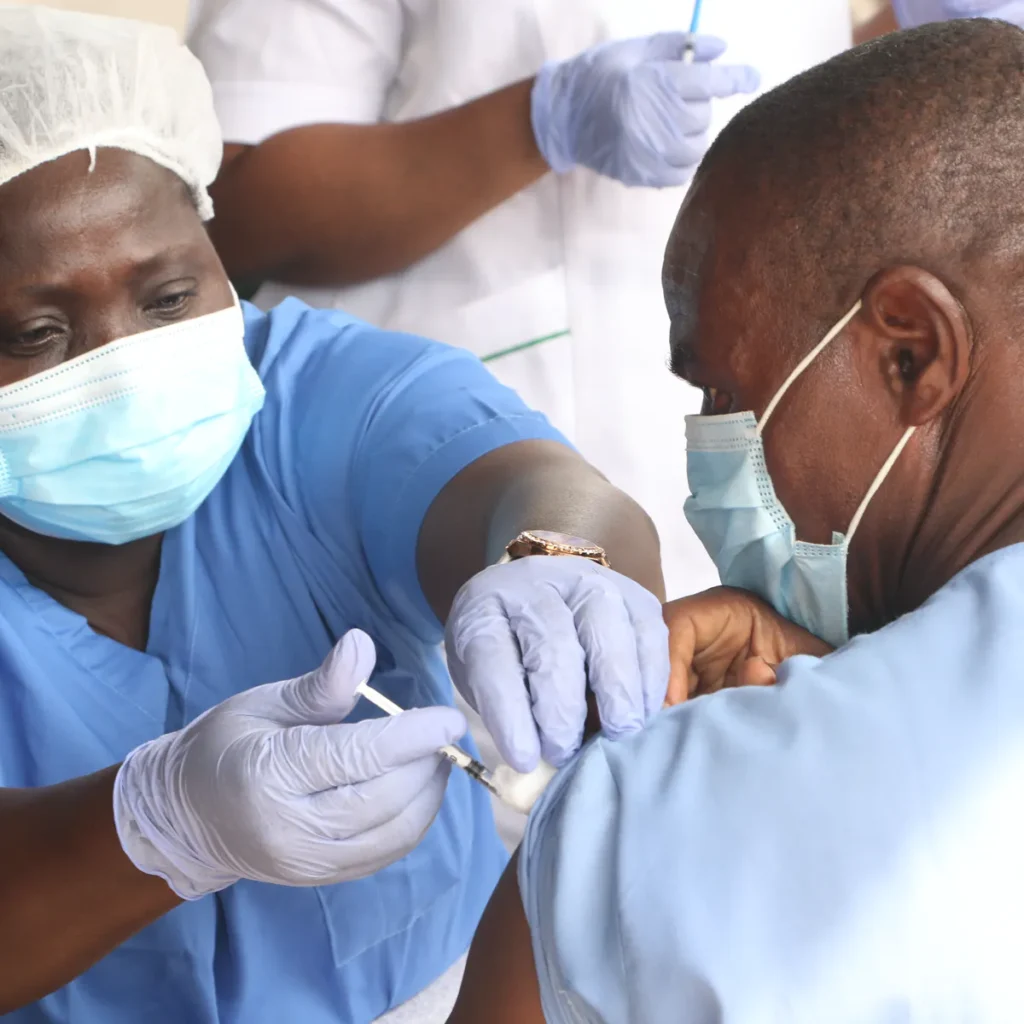
The Nigerian government has celebrated reaching its goal of vaccinating 70 per cent of the nation’s population against the novel COVID-19 pandemic.
This was disclosed by the director of disease control and immunisation at the National Primary Health Care Development Agency (NPHCDA), Dr. Bassey Okposen, during an interview with journalists in Abuja, to announce the milestone.
As reported by Science Nigeria, Nigeria’s objective of fully vaccinating 70 per cent of her eligible population by December 2022 was attained on October 31, 2023. According to Okposen, ensuring 70 per cent coverage with COVID-19 vaccines is a global imperative and Nigeria has now achieved this goal for its eligible population.
He further revealed that 80 per cent of eligible individuals in the country have received at least partial vaccination against COVID-19. Additionally, 17.5 million people in Nigeria have received booster doses of COVID-19 vaccines, resulting in a total of 132,212,099 vaccine doses administered as of October 1, 2023.
Okposen highlighted that six states have reached the milestone of fully vaccinating 100 percent of their target populations, and these states include Nasarawa, Jigawa, Osun, Kaduna, Kano and Adamawa. This achievement marks a crucial step in Nigeria’s ongoing efforts to combat the pandemic and protect the health and well-being of its citizens.
“With an unwavering commitment to public health, Nigeria’s vaccination campaign has surpassed expectations, demonstrating the nation’s determination to control the spread of the virus and shield its population from the devastating impacts of COVID-19,” Okposen emphasized.
He explained that vaccinating 70 per cent of a country’s population against COVID-19 signifies that a significant portion of the population has received the necessary COVID-19 vaccine doses. This level of vaccination coverage is widely regarded as a crucial milestone in achieving herd immunity and controlling the virus’s spread within a population.
Herd immunity, also known as population immunity, occurs when a substantial proportion of a community becomes immune to a disease through either vaccination or prior infection. When a high percentage of the population is immune, it forms a barrier that impedes the virus’s easy transmission from person to person. This not only safeguards those who are vaccinated but also indirectly protects those who cannot receive the vaccine due to medical conditions or other factors.
By vaccinating 70 per cent of the population against COVID-19, a country significantly reduces the risk of widespread transmission, severe illness, and death caused by the virus. It also eases the burden on healthcare systems and paves the way for a gradual return to normalcy, including the reopening of businesses, schools, and public spaces.
However, Okposen cautioned that achieving a 70 per cent vaccination rate does not signal the end of the pandemic. The virus can still circulate among unvaccinated individuals, and new variants may emerge, necessitating ongoing monitoring and potential updates to vaccination strategies. Therefore, he urged Nigerians to continue adhering to public health measures, such as wearing masks for those with comorbidities, practicing good hygiene, and maintaining social distancing, which remains crucial even with high vaccination rates in the country.
Regarding the strategies employed by Nigeria, Okposen explained that several approaches, including SCALES 3.0 (service delivery, communication, accountability, logistics, electronic management of immunisation data, and supportive supervision), as well as the integration of COVID-19 into routine immunisation, have been utilised to deliver vaccines to the target populations.
As of October 31, 2023, data from the Nigeria Centre for Disease Control and Prevention (NCDC) revealed that over 5,708,974 samples have been tested, resulting in 266,675 confirmed cases and 259,953 individuals discharged from the virus. Presently, there are 3,567 active cases, and 3,155 deaths have been reported.
Since the commencement of the COVID-19 vaccination campaign in the United States in mid-December 2020, Africa has eagerly awaited its turn. For Nigeria, that opportunity arrived on March 2, 2021, when the first batch of 3.9 million doses of AstraZeneca’s COVID-19 vaccine arrived from the Serum Institute of India.
Since the vaccination campaign’s inception in the country, seven vaccines have gained approval for use in Nigeria, with three of them approved for clinical trials. These vaccines include Moderna’s Spikevax, Pfizer/BioNTech’s Comirnaty, Gamaleya’s Sputnik V, Johnson & Johnson’s Janssen/Jcovden, Oxford/AstraZeneca’s Vaxzevria, Serum Institute of India/Oxford/AstraZeneca’s Covishield and Sinopharm (Beijing)’s Covilo.
The three vaccines approved for clinical trials are Pfizer/BioNTech’s Comirnaty, Johnson & Johnson’s Janssen, Jcovden and Oxford/AstraZeneca’s Vaxzevria.

